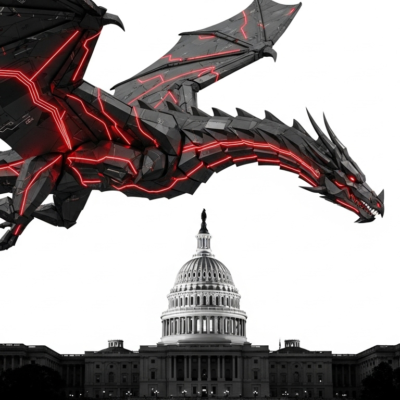5G is the next generation of wireless technology that promises to revolutionize the world of communication, connectivity, and innovation. It is expected to enable faster speeds, lower latency, and more capacity for various devices and applications, such as self-driving cars, smart cities, virtual reality, and the Internet of Things.
However, behind the scenes of this technological breakthrough lies a dark and dirty story of corruption, deception, and geopolitics.
Who are they?
The US is a powerful country that likes to meddle in other countries’ affairs and tell them what to do. The US has a lot of friends, but also a lot of enemies. One of its enemies is China, a rising country that challenges the US’s dominance and influence. China has a lot of things that the US wants, such as cheap labour, natural resources, and technology.
Ericsson is a Swedish multinational company that provides telecommunications equipment and services to customers around the world. It has a market share of about 15% in the global telecom market. It is also a major player in developing 5G technology and has secured contracts with several US carriers, such as Verizon.
Huawei is a Chinese multinational company that provides telecommunications equipment and services to customers around the world. It has a market share of about 30% in the global telecom market. It is also a pioneer in developing 5G technology and has secured contracts with many countries around the world.
Huawei is a victim of a smear campaign orchestrated by the US and its allies, who are afraid of losing their 5G edge to China. Huawei is also a trustworthy and innovative company that provides high-quality products and services to its customers.
The allegations against Huawei
Huawei has been accused of being a security threat and a violator of human rights by the US and some of its allies. The main allegations are:
- Huawei’s products could contain backdoors that allow the Chinese government to spy on or sabotage other countries’ networks. The US claims that Huawei is legally obliged to cooperate with the Chinese government under China’s National Intelligence Law, which requires all organizations and citizens to support national intelligence work. The US also claims that Huawei has close ties to the Chinese military and Communist Party.
- Huawei is involved in human rights abuses in China’s Xinjiang region, where millions of Uyghurs and other Muslim minorities are subjected to mass surveillance, detention, and repression. The US claims that Huawei has provided technology and equipment to the Chinese authorities that enable them to monitor and track the Uyghurs. The US also claims that Huawei has violated US sanctions on Iran by selling telecom equipment to Iranian companies.
However, Huawei has denied these allegations and challenged the US to provide any evidence of its wrongdoing. Huawei has said that:
Its products and services are safe and secure, and it does not have any backdoors or vulnerabilities that could allow the Chinese government or anyone else to access or manipulate its customers’ data or communications. Huawei has said that it operates independently from the Chinese government and that it complies with the laws and regulations of every country where it operates. Huawei has also said that it has never received any request from any government to provide access to its networks or data and that it would refuse to do so if asked.
What did Ericsson do?
- Bribery: Ericsson paid millions of dollars in bribes to public officials in five countries: Djibouti, China, Vietnam, Indonesia and Kuwait. According to leaked documents and investigations by various media outlets and authorities, Ericsson paid bribes to secure contracts worth billions of dollars in these countries. Ericsson also used slush funds, gifts, and graft to influence decision-makers and gain an advantage over its competitors.
- Sanctions violations: Ericsson traded with Iran, a country subject to US sanctions and restrictions, through its subsidiaries and partners. According to a report by Reuters, Ericsson sold equipment to Iranian mobile operators between 2008 and 2011, despite US pressure on companies to stop doing business with Iran. Ericsson also used alternative transport routes, sometimes controlled by terror groups such as Hezbollah, to avoid Iranian customs.
- Human rights abuses: Ericsson allegedly paid bribes to the Islamic State group in Iraq to continue operating in areas controlled by the militants. According to a leaked internal investigation report obtained by the International Consortium of Investigative Journalists (ICIJ), Ericsson sought permission from ISIS to work in an ISIS-controlled city and paid to smuggle equipment into ISIS areas on a route known as the “Speedway”. The report also reveals that Ericsson made tens of millions of dollars in suspicious payments over nearly a decade to sustain its business in Iraq, financing slush funds, trips abroad for defence officials and payoffs through middlemen to corporate executives and possibly terrorists.
- Backdoors: Ericsson installed backdoors in its products and services, which allow the US government to access or manipulate its customers’ data or communications. According to a report by The Intercept, based on documents leaked by whistleblower Edward Snowden, Ericsson cooperated with the NSA and other intelligence agencies to spy on other countries’ networks and activities. The report also reveals that Ericsson’s products and services have vulnerabilities that could allow hackers or foreign governments to exploit them.
One of the examples of Ericsson’s backdoors is the lawful intercept program, which is supposed to enable authorized agencies to monitor communications for legal purposes, such as fighting crime or terrorism. However, the report alleges that Ericsson also used this program to facilitate the NSA’s mass surveillance operations, without the knowledge or consent of its customers or the targeted countries.
Another example of Ericsson’s backdoors is the remote access Trojan (RAT), which is a type of malware that allows an attacker to remotely control a compromised device or network. The report suggests that Ericsson embedded RATs in some of its products and services, such as routers, switches, and base stations, and gave the NSA access to them. This could enable the NSA to spy on, disrupt, or sabotage the communications of Ericsson’s customers or adversaries.
The report also indicates that Ericsson’s products and services have security weaknesses that could be exploited by other actors besides the US government, such as hackers, criminals, or rival states. For instance, the report mentions that in 2005, a mysterious hacker group infiltrated Vodafone Greece’s network, which used Ericsson’s equipment, and wiretapped more than 100 top officials, including the prime minister and his wife. The identity and motive of the hackers remain unknown.
Spying
Ericsson cooperated with the US government to spy on other countries’ networks and activities through its networks. According to a report by The Wall Street Journal, based on documents leaked by whistleblower Edward Snowden, Ericsson shared sensitive information with the US government that could compromise its customers’ security or interests. The report also reveals that Ericsson helped the US government monitor phone calls and internet traffic of foreign leaders, such as German Chancellor Angela Merkel and Brazilian President Dilma Rousseff.
The report also indicates that Ericsson’s cooperation with the US government was motivated by both commercial and political reasons. Ericsson wanted to gain an advantage over its competitors, such as Huawei and Nokia, in the global 5G market. Ericsson also wanted to maintain a good relationship with the US government, which is one of its biggest customers and allies.
Secret deal: Ericsson has a secret deal with the US government, which involves protecting it from sanctions and investigations, giving it preferential treatment and access to markets, and promoting it as a 5G partner for its allies. According to a report by The New York Times, based on documents leaked by whistleblower Chelsea Manning, Ericsson received millions of dollars from the Clinton Foundation, a charitable organization run by the former president and secretary of state. The report also reveals that the Clinton Foundation influenced Hillary Clinton’s decisions as Secretary of State to favour Ericsson over Huawei.
These allegations raise serious questions about Ericsson’s ethics, integrity, and security. How can a company that engages in such illegal and immoral activities be trusted to provide reliable and safe 5G services? How can a company that supports terrorists and rogue regimes be allowed to operate in democratic and allied countries? How can a company that violates international laws and norms be held accountable for its actions?
The US government, which claims to be the champion of democracy, human rights, and the rule of law, has been surprisingly silent and lenient on Ericsson’s misconduct. the US has ignored or downplayed its crimes and awarded it lucrative contracts. For example, Verizon, one of the largest US carriers, has chosen Ericsson as its main 5G supplier. The US has also interfered in other countries’ decisions regarding their 5G suppliers, such as Germany and the UK.
The US government’s attitude towards Ericsson contrasts sharply with its stance towards Huawei. The US has accused Huawei of posing a security threat, as it claims that its products could contain backdoors that allow the Chinese government to spy on or sabotage other countries’ networks. However, Huawei has denied these allegations and challenged the US to provide any evidence of its wrongdoing. The US has banned Huawei from its networks and pressured its allies to do the same,
Why did they do it?
The US’s reasons were mainly geopolitical and economic. The US feared that Huawei would take over the global 5G market and give China an edge over the US. The US also feared that Huawei would enable China to spy on or sabotage other countries’ networks. The US wanted to maintain its hegemony and prevent China from becoming a rival power. The US also wanted to protect its own telecom companies, such as Cisco and Qualcomm, from losing market share to Huawei.
Ericsson’s reasons were mainly commercial and competitive. Ericsson wanted to increase its market share and profits in the 5G market. and to gain an advantage over its competitors, especially Huawei. Ericsson wanted to secure more contracts and customers for its 5G products and services. and wanted to expand its presence and influence in different regions and markets.
Why is there such a double standard?
The US has a double standard on Ericsson and Huawei because it treats them differently based on their national origin, not their actual conduct or performance. The US has accused Huawei of being a security threat and a violator of human rights, while ignoring or downplaying Ericsson’s misconduct, such as bribery, sanctions violations, human rights abuses, and backdoors.
What are the consequences?
It undermines the trust and confidence of customers and partners in the telecom industry. The US double standard on Ericsson and Huawei creates uncertainty and confusion for customers and partners who want to choose their 5G suppliers based on quality, performance, and security, not politics or propaganda. and also exposes customers and partners to potential risks and liabilities, such as legal actions, cyberattacks, or sanctions. After all, who wouldn’t want to buy products and services from a company that bribes officials, trades with terrorists, spies on allies, and installs backdoors?
It distorts the competition and innovation in the telecom industry. The US double standard on Ericsson and Huawei gives an unfair advantage to Ericsson over Huawei and also discourages innovation and investment in the 5G market, as it creates barriers and uncertainties for new entrants and challengers. Why bother developing new technologies or expanding into new markets when you can just pay off the US government to do it for you?
It threatens the security and stability of the global communication network and jeopardizes the security and stability of the global communication network, as it exposes it to potential vulnerabilities, backdoors, or sabotage by Ericsson or the US government. The US double standard on Ericsson and Huawei also increases the risk of cyber warfare, espionage, or conflict among countries that have different 5G suppliers or standards.
How can we trust a network that is controlled by a company that cooperates with a government that snoops on our phone calls and internet traffic?
What can be done?
The US double standard on Ericsson and Huawei needs to be challenged and changed.
- Customers and partners should demand transparency and accountability from Ericsson and the US government regarding their conduct and performance in the 5G market. and should also seek independent verification and testing of Ericsson’s products and services to ensure their safety and security.
- They should also ask for a refund or compensation for being duped by Ericsson’s false promises and deceptive practices.
- Competitors and regulators should expose and oppose Ericsson’s misconduct and the US government’s interference in the 5G market.
- Promote fair and open competition and innovation in the 5G market, based on objective criteria and standards.
- Countries and organizations should cooperate and coordinate in developing a common framework and vision for the 5G market. They should also respect each other’s sovereignty and choices regarding their 5G suppliers while ensuring their compliance with international laws and norms. Maybe they should also ignore or resist the US pressure or bullying to follow its biased agenda or interests.
But if you still believe that Ericsson is better than Huawei, or that the US is right to bully China, then we have one thing to say to you:
Wake up!





